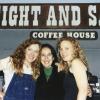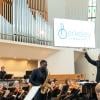
Were those rhythmically stuttering pizzicatos in Caroline Shaw’s Concerto for Piano and Strings the sound of raindrops? Or were they birdcalls, echoing and answering each other in a deep green wood? Such were the beguiling speculations that the pixilated passage raised in a performance by Berkeley Symphony musicians on Monday, Sept. 30, at the Freight & Salvage coffeehouse, part of the first program in the orchestra’s chamber series this season.
If the downtown Berkeley venue, with its widely arced seating, isn’t the ideal setting for chamber music, that didn’t matter in this case, with a small crowd occupying the better center seats. And then there was the added value of smelling the fragrant lentil soup on offer in the lobby. The Freight always seems to put people in a convivial mood.
The music, of course, was the main item on the menu. Nothing proved more savory than Shaw’s composition, a transcription of her 2023 Concerto for Harpsichord and Strings. Violist Darcy Rindt, who curated the evening and spoke before each piece, joined violinists Sarah Elert and Emanuela Nikiforova, cellist Stephanie Wu, and pianist Kymry Esainko onstage.
While the keyboard gets the first lines, with some small ripples growing into more expansive arpeggios, the piece is not a solo showcase with the strings in a supporting role. In the first of many animating touches on Monday, the string ensemble rode a melodic updraft before gliding down, as if on a carnival ride. An infectious playfulness took hold.
When a pulsing minimalist chant emerged in the strings, the piano puttered away in contented self-absorption. That seemed to give the strings the idea to slide off their repeated notes and transition to that allusively suggestive plucking. After the pizzicatos gradually died out, though only after rallying in an amusing way, the ensemble voiced a solemn hymnlike passage as if in benediction.
The players brought a sense of delicacy and depth to every revelation — including a little burst of hoedown fiddling near the end. Patter and pattern merged, while remaining fresh and elusive. At once deliciously entertaining and alluringly mysterious, Shaw’s piece is carefully made to seem spontaneously improvised, artless in its art.
Credit the musicians for capturing that spirit. When a theme or phrase returned, it seemed both nostalgic and adventurous. The players remained united in the cause, delivering Shaw’s unorthodox demands with finesse and a buoyant sense of fun. A wreath of smiles broke out at the end.

The program opened with Clara Schumann’s Piano Trio in G Minor, an admirable, ambitious four-movement work that opens with a decisive, well-developed Allegro and ends with a fugue-enriched finale. A charming, folk-song-inflected Scherzo and a waltz-tune Andante are tucked in between.
The musicians made a vigorous case for the work. They gave the exposition of the first movement a narrative drive. The Scherzo was limber, set off by a poised trio section. After getting the third-movement waltz off to a swaying start, the piano gave way to a warm lyrical exchange for the strings. The fugue arrived emphatically, sounding even more charged on its return,
Appealing as the performance was, violinist Elert’s wobbly intonation undermined the effort. Cellist Wu carried the day with her plush, plangently singing tone and polished musicianship. Esainko dispatched the piano part, as he did throughout the concert, with a sensitivity and discretion that bordered at times on under-characterized.
The Piano Quartet in A Minor by the Spanish composer Joaquín Turina (1882–1949) rounded out the bill. The three string players sang together soulfully, more than once in unison. That was one of several theatrical effects, including high tremolos over a long-lined melody and a flurry of piano trills.
Pleasant enough, the piece was all rather familiar sounding with its scattered rhapsodies, dance meters, and quiet meditations. Nikiforova, Rindt, Wu, and Esainko gave it their all. But in the company of Shaw and Schumann, Turina only had so much to offer.
Rindt’s boisterous arrangement of “Roxanne” by the Police sent the audience home with the kick a well-executed encore can add. This one did exactly that.




